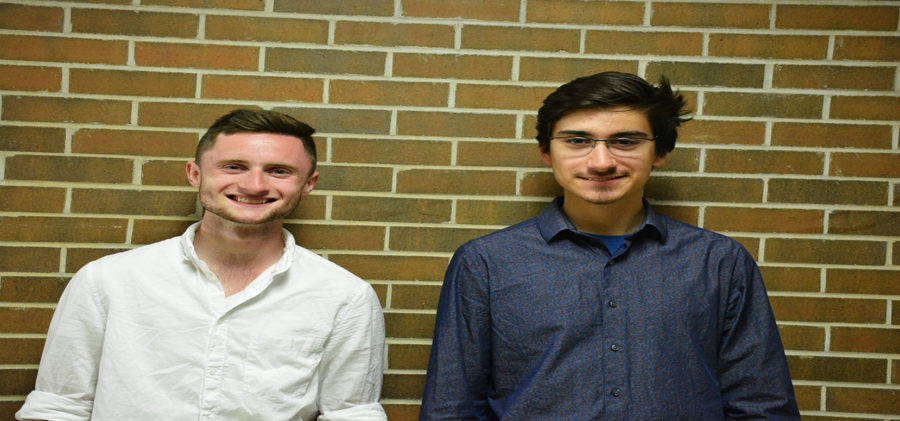Meet the new president and vice president
From left to right: Freshmen engineering major and new study body president Lucas Frey and his running mate freshmen engineering major and new vice president Skylar Lopez-Kohler.
Following the debate on April 3, the voting results came in that the new University of Wisconsin- Platteville student body president and vice president are freshman general engineering major Lucas Frey and freshman general engineering Skylar Lopez-Kohler. Frey explained he was inspired to run by the sitting student body president senior Matthew Castelaz.
“I work under Matthew Castelaz, the sitting student body president and there was a little bit of mentorship there,” Frey said. “I work with him on a lot of things outside of student governance, so when he kind of said, ‘oh I’m going to be graduating’, it was kind of one of those things to pick it up and keep it going. There was only one other ticket. It was nice to have a contested election as well, giving students that choice.”
For Lopez-Kohler, he wanted to make a difference on campus which is what inspired him to join Frey.
“Being able to have an impact in student’s lives and experience is for sure the draw for me,” Lopez-Kohler said. “I started out not entirely understanding what student governance was until Lucas kind of enlightened me to that and we get to experience all the different ways student senate indirectly affects everybody’s day to day life. I’m really enjoying wanting to do this for the fact of making a difference in someone else’s experience.”
In the debate, Frey and Lopez-Kohler introduced their platform slogan “IDEA.”
“So, IDEA stands for inclusion, diversity, education and attitude,” Lopez-Kohler explained. “By saying we have an ‘idea’ it’s pretty direct and to the point with what our initiatives are. With the inclusion piece, were looking to involve students as much as possible by reaching out and increasing the transparency between student governance, administration. The diversity piece, making sure we reach out to perspective students who are the future and soon to be backbone of the campus, making sure were not just reaching out into our backyard but you know, a couple hours away. To have a difference in background, experience, and demographic, it brings a lot of value to the campus.”
Frey then went on to explain the second half of “IDEA” by going in depth on education and attitude.
“And then in terms of the second two, education and attitude, this is what this institution is, we’re here to get an education and insuring that were getting a quality education. It’s the promise that were all getting a quality education and ultimately at the end of the day, when you set everything aside, that’s what were here for,” Frey said. “And finally, attitude, which kind of loops back around to the inclusion and diversity piece, we want to make sure that everyone that is here can get an education. The quote on our page is, and it applies to everyone, ‘The man who says he can’t and the man who says he can are both usually right’. So, when you come to the University, you know you can. You can graduate in four years, even if that doesn’t seem like a possibility. You can find a scholarship. You can pass this test. And that’s really something that as campus leaders we want to promote. Some days are tough, but you can do this if you really want to lead by example,” Frey said.
Frey and Lopez-Kohler want to accomplish many different things with their new roles but overall the main focus is student representation in the governance role.
“First and foremost, filling student senate, student senate represents a student body,” Lopez-Kohler said about what they want to accomplish. “It shouldn’t really be 20 percent or percent full. From an inclusive standpoint, increasing the awareness of the office of multicultural student affairs. Just making sure that that is communicated to students and letting people know that those events are out there because that’s just more ways for students to participate and get involved. Also, from more inclusive standpoints, there’s been some talk, some feedback, some criticism on the communication between administration and students regarding things from sexual harassment to academic pieces that don’t make sense. So somehow bridging that gap, making that gap not a gap anymore but more of a bridge,” Lopez-Kohler said.




